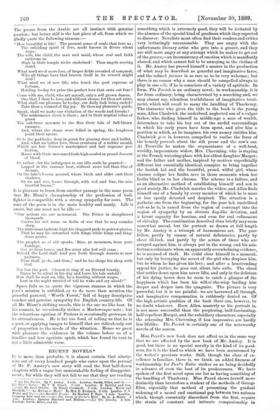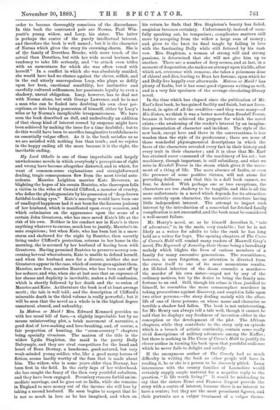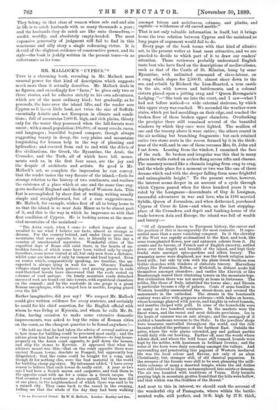RECENT NOVELS.* IT is more than probable, it is almost
certain, that ninety- nine out of every hundred people who enter upon the perusal of Mr. F. Anstey's new story will read the first half-dozen chapters with a vague but unmistakable feeling of disappoint- ment; for while they will not fail to see that they are reading
• (1.) The Pariah. By F. .instey. 3 vols. London: Smith, Elder, and Co — 42..) Pours Sister. By lo X Petard. 3 vole London: E Bentley sad Son. —(3.) My Lord Othello. fly Henry Cromwell. 3 vols. London Hurst and ItInekett.— el.) Matron or Maid ? By Mrs. B. Kennard. 3 Tole. London: F. V. White and Co.—(5.) Randall Trevor. By Herbert P. Earl. 2 vols. London Fampson Low and Co.—(6.) The Curse of (hnte's Hold By G. d. Salty. 2 vols. London Spencer Blackett and Hallam.-7.) The County. 2 yob Loudon: Smith, Elder, and Co.
something which is extremely good, they will be irritated by the absence of the special kind of goodness which they expected to discover. Novelists must often find their readers and critics very irritatingly unreasonable. They are angry with the unfortunate literary artist who gets into a groove, and they are still more angry at any attempt which he makes to get out. of the groove,—an inconsistency of emotion which is manifestly absurd, and which cannot fail to be annoying to the victims of it. Mr. Anstey has proved himself a master in the production of what may be described as graceful and imaginative farce, and the refined farceur is so rare as to be very welcome; but there is no reason why a man should be compelled always to play in one role, if he is conscious of a variety of aptitude. In form, The Pariah is an ordinary novel ; in workmanship, it is far from ordinary, being characterised by a searching and, we may almost say, relentless truthfulness of imaginative treat- ment, which will recall to many the handling of Thackeray. The character who gives the title to the book is the young man, Allen Chadwick, the underbred, neglected son of a vulgar father, who, finding himself in middle-age a man of wealth, determines to take his boy out of the sordid surroundings in which his early years have been spent, and give him a position to which, as he imagines, his own money entitles him. Chadwick pre is, however, compelled to realise the force of the homely proverb about the silk purse and the sow's ear. At Trouville he makes the acquaintance of a well-bred, worldly, impecunious widow, Mrs. Chevening, who is staying at the French watering-place with her eldest daughter Margot ; and the father and mother, inspired by motives superficially different but essentially identical, conspire to bring together the loutish lad and the beautiful, proud, wilful girl, whose charms eclipse her faults, save in those moments when her faults blind us to her charms. The scheme is a failure, and as an alternative method of establishing himself and son in good society, Mr. Chadwick marries the widow, and Allen finds himself one of a family by every member of which he is more or less openly detested and despised. The situation is a pathetic one from the beginning, for the poor lad, uncivilised cub as he is, is raised from the region of contempt into the region of sympathy by an obvious dog-like devotion, and a latent capacity for heroism, and even for real refinement of chivalry. The combination described thus briefly may seem somewhat unreal, but the portrait as drawn at full length by Mr. Anstey is a triumph of harmonious art. The poor fellow, partly by reason of natural deficiencies, partly by sheer ill-luck, and partly by the action of those who are arrayed against him, is always put in the wrong, and his mis- fortunes culminate when, on apparently overwhelming evidence, he is accused of theft. He could clear himself in a moment, but only by betraying the secret of the girl who despises him, but to whom he has given his love ; and after a heartrending appeal for justice, he goes out, silent, into exile. The cloud that settles down upon him never lifts, and only in the delirium of his dying hours does he seem to catch a glimpse of the happiness which has been his will-o'-the-wisp leading him deeper and deeper into the quagmire. The picture is very powerful, but it is too painful : we are harrowed all through, and imaginative compensation is ruthlessly denied us. Of the high artistic qualities of the book there can, however, be no doubt whatever. Even Allen, masterly as his portrait is, is not more successful than the perplexing, half-fascinating, half-repellent Margot, and the subsidiary characters, especially the scheming Mrs. Chevening, if less impressive, are hardly less lifelike. The Pariah is certainly one of the noteworthy novels of the season.
Miss Peard's new book does not affect us in the same way that we are affected by the new book of Mr. Anstey. It is good, but there is no special novelty in the kind of its good- ness, for it is the kind to which we have been accustomed by the writer's previous works. Still, though the class of ex- cellence is familiar, there is, we think, an added fineness of workmanship. for Paul's Sister strikes us as being decidedly in advance of even the best of its predecessors. We have spoken of the first novel upon our list as having something of the handling of Thackemy. Miss Peard shows herself more distinctly than heretofore a student of the methods of George Eliot, especially that method of presenting the gradual widening of a moral and emotional gap between two natures which, though essentially discordant from the first, require the strain of constant and intimate companionship in
order to become thoroughly conscious of the discordance. In this book the contrasted pair are Norma, Paul Win- yeatt's young widow, and Lucy, his sister. The latter is perhaps the centre of the purely intellectual interest, and therefore the book is well named ; but it is the character of Norma which gives the story its crowning charm. She is of the family of Dorothea Brooke, with more touch of the actual than Dorothea, but with her wide moral horizon, her tendency to take life seriously, and "to attack even trifles with an earnestness for which she was often vexed with herself." In a conflict in which she was absolutely unaided, she would have had no chance against the clever, selfish, and in the end utterly unscrupulous Lucy, who plays so deftly upon her keen, emotional sensibility, her instinctive and carefully cultured selflessness, her passionate loyalty to even a shadowy, unreal obligation. Lucy, however, has to deal not with Norma alone, but with George Lawrence, and he is not a man who can be fooled into doubting his own clear per- ceptions, or into losing possession of himself, either by Lucy's wiles or by Norma's inexplicable irresponsiveness. We have seen the book described as dull, and undoubtedly an addition of that cheap kind of interest roused by suspense might have been achieved by making the issue for a time doubtful; but to do this would have been to sacrifice imaginative truthfulness to an essentially vulgar effect. As it is, the book satisfies us as we are satisfied with nothing less than truth ; and, we rejoice in the happy ending all the more because it is the right, the inevitable ending.
My Lord Othello is one of those improbable and largely unwholesome novels in which everybody's perceptions of right and wrong have become altogether distorted, and in which, for want of common-sense explanations and straightforward dealing, tragic consequences flow from the most trivial ante- cedents. Maurice Leighton marries Kate Devereux, so blighting the hopes of his cousin Beatrice, who thereupon falls a victim to the wiles of Oswald Clifford, a monster of cruelty, who defies the pbysiognomists by his possession of" deep-brown faithful-looking eyes." Kate's marriage would have been one of unalloyed happiness had it not been for the fatuous jealousy of her husband, which is manifested upon every occasion, and which culminates on the appearance upon the scene of a certain John Greatorex, who has once saved Kate's life at the risk of his own. Neither in his conduct nor in Kate's is there anything whatever to excuse, much less to justify, Maurice's in- sane suspicions ; but when Kate, who has been lost in a snow- storm and sheltered for the night by Beatrice, then secretly living under Clifford's protection, returns to her home in the morning, she is accused by her husband of having been with Greatorex. Having promised Beatrice to preserve secrecy con- cerning herreal whereabouts, Kate is unable to defend herself, and when the husband sues for a divorce, neither she nor Greatorex appear in the ease, which of course goes against them. Maurice, now free, marries Beatrice, who has been cast off by her seducer, and who, when she at last sees that an exposure of her shame and duplicity is inevitable, makes a full confession, which is shortly followed by her death and the re-union of Maurice and Kate. As literature the book is of at least average merit ; the tale is well told; and the description of Clifford's miserable death in the third volume is really powerful ; but it will be seen that the novel as a whole is in the highest degree unnatural, absurd, and unhealthy.
In Matron or Maid ? Mrs. Edward Kennard provides us with her usual bill of fare,—a slightly improbable but by no means uninteresting plot, a brisk movement of narrative, a good deal of love-making and love-breaking, and, of course, a fair proportion of hunting, the " cross-country " chapters being specially vivacious. The matron of the title is the widow Lydia Stapleton, the maid is the pretty Dolly Dalrymple, and they are rival competitors for the hand and heart of Beau Dornay, a handsome, good-natured, but very weak-minded young soldier, who, like a good many heroes of fiction, seems hardly worthy of the fuss that is made about him. The widow, who is some years older than Dornay, has been first in the field. In the early days of her widowhood, she has caught the fancy of the then very youthful subaltern, and they have been engaged. Pecuniary reasons forbid an im- mediate marriage, and he goes out to India, while she remains in England to save money out of the income she will lose by taking a second husband. He soon begins to suspect that he is not so much in love as he has imagined, and when on his return he finds that Mrs. Stapleton's beauty has faded, suspicion becomes certainty. Unfortunately, instead of man- fully speaking out, he temporises ; complicates matters still more by accepting from the widow a large sum of money ; and gives to the knot its final tangle by falling in love with the fascinating Dolly while still fettered by his rash vow. Mrs. Stapleton, a woman of strong will and strong passions, is determined that she will not give him up to another. There are a number of fiery scenes, and at last, in a moment of desperation, she makes an attempt upon his life, after which act, overcome with remorse, she takes a poisonous dose of chloral and dies, leaving to Beau her fortune, upon which he and Dolly live happily ever afterwards. Matron or Maid ? has plenty of faults, but it has some good vigorous writing as well, and is a very fair specimen of the average circulating-library novel.
In the time which has elapsed since the publication of Mr. Earl's first book, he has gained facility and finish, but not force. Indeed, in spite of all the crudities—and they were many—of His Sisters, we think it was a better novel than Randall Trevor, because it better achieved the purpose for which the novel exists,—the awakening of the reader's interest by an imagina- tive presentation of character and incident. The style of the new book, except here and there in the conversations, is less wooden than the style of its predecessor ; there are none of those wonderful physiognoraical descriptions in which the faces of the characters revealed every fact in their history and every trait in their character ; and it is clear that Mr. Earl has attained surer command of the machinery of his art ; but machinery, though important, is still subsidiary, and what we miss in Randall Trevor is the steam which gives it the move- ment of a thing of life. The mere absence of faults, or even the presence of some positive virtues, will not atone for pervading dullness ; and that this is a dull book cannot, we fear, be denied. With perhaps one or two exceptions, the
characters are too shadowy to be tangible, and this is all the more unfortunate in a novel which depends for its attractive- ness entirely upon character, the narrative structure having little independent interest. The attempt to impart such interest by the introduction of a somewhat far-fetched family complication is not successful, and the book must be considered a well-meant failure.
Mr. Henty's novel, or, as he himself describes it, tale of adventure," is, in the main, very readable ; but he is not. likely as a writer for adults to take the rank he has long held as a writer for boys. The opening chapters of The Curse of Carne's Hold will remind many readers of Maxwell Gray's novel, The Reproach of Annesley, their theme being a hereditary malady which blights the lives of various members of a family for many successive generations. The resemblance, however, is soon forgotten, as attention is diverted from the curse itself to one of its most momentous results. An ill-fated inheritor of the doom commits a murder— the murder of his own sister—urged not by any of the ordinary motives, but by the desire to bring the family mis- fortune to an end. Still, though his crime is thus justified to himself, he resembles the more commonplace murderer in taking precautions against discovery, and suspicion falls upon two other persons,—the story dealing mainly with the after- life of one of these persons, on whose name and character aa terrible a shadow had fallen. The book is not uninteresting, for Mr. Meaty can always tell a tale well, though it cannot be said that he displays any freshness of invention either in the conception or the development of the plot. The African chapters, while they contribute to the story only an episode which is a breach of artistic continuity, contain some really vivid descriptions of military adventure among the Kaffirs ; but there is nothing in The Curse of Carne's Hold to justify its. clever author in turning his back upon that youthful audience which he never fails to delight and satisfy.
If the anonymous author of The County had as much difficulty in writing the book as other people will have in reading it, he or she is a person to be sincerely pitied. Long intercourse with the county families of Loamshire would certainly supply ample material for a negative reply to the question, "Is life worth living ?" It would be misleading to say that the sisters Esme and Frances Nugent provide the story with a centre of interest, because there is no interest to have a centre ; but they are the most prominent figurcs, and their portraits are a vulgar treatment of a vulgar theme.
They belong to that class of women whose sole end and aim in life is to catch husbands with so many thousands a year ; and the husbands they do catch are like unto themselves,— sordid, worldly, and absolutely empty-headed. The most expansive generosity of judgment will fail to find in this wearisome and silly story a single redeeming virtue. It is devoid of the slightest evidence of constructive power, and its style—the book is jerkily written in the present tense—is as unfortunate as its tone.








































 Previous page
Previous page